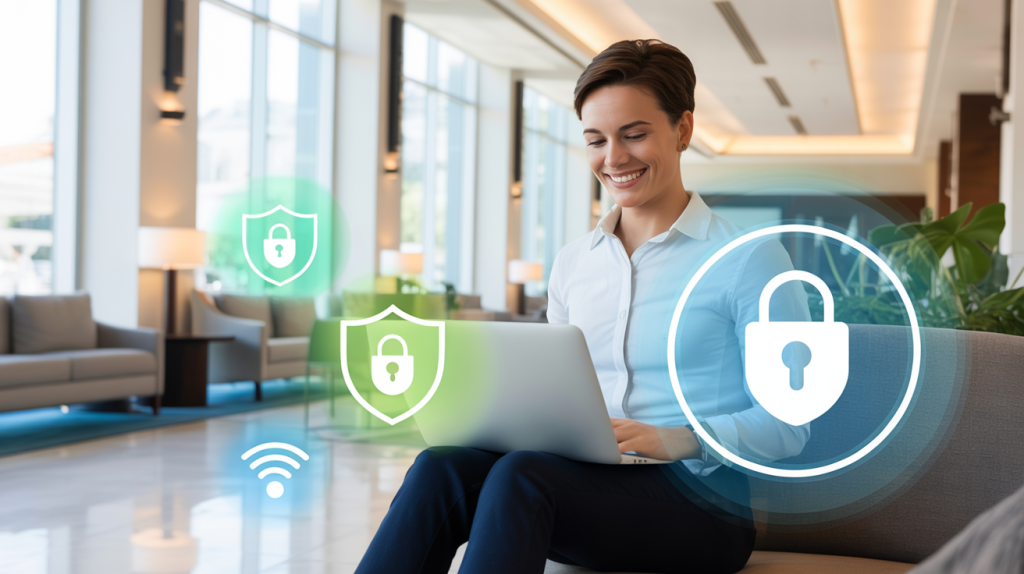You’ve probably connected to a lot of hotel Wi-Fi networks throughout your life without even thinking twice about it. Unfortunately, one of the most overlooked part of traveling is hotel Wi-Fi security. We think it’s safe to connect to these networks because we suppose that many others are connected at the same time. However, the number of people connected at the same time doesn’t make it a secure connection or prove that the hotel network security is on a high-level. In fact, your personal data is very vulnerable on hotel networks. The good news is that you can easily protect yourself and your data by following proven hotel Wi-Fi security practices:
1. Use a VPN to Connect to the Hotel Wi-Fi

Think of a VPN (Virtual Private Network) as a tunnel that protects everything your devices send to the hotel’s Wi-Fi network. It encrypts all the information sent and received. Without VPN protection, you might be logging in to your email, bank account or other personal accounts, while that information travels unprotected across the network. Hackers with even basic knowledge on Wi-Fi sniffing could potentially inspect and intercept the data being transferred across the network and get your credentials.
Here’s a real scenario: You’re checking your bank account after paying for a coffee at your hotel’s bar, while someone nearby is monitoring network traffic. Without VPN protection, they could intercept the data when you accessed your bank account and potentially be able to get your credentials. With a VPN enabled, your data stays within the protective tunnel as encrypted. A quality VPN must always be your first line of defense when connecting to a hotel Wi-Fi.
Setting up a VPN takes just two minutes. Download a trusted VPN application, like NordVPN, ExpressVPN, ProtonVPN, activate it before connecting to hotel Wi-Fi, and you’re now on a secure connection. Make it a habit to connect to a VPN first whenever you use hotel Wi-Fi. Connect to your VPN first, then access your email or the banking app. Given that many of us use public networks on a daily basis, paying for VPN plan should be on your to-do list.
2. Verify HTTPS and Look for Secure Connection

When you open up a website on your browser do you always check for a padlock, or double-check the URL? This confirms a secure connection, encrypting the data you send to and receive from the website. A website starting with https:// or which has a visible padlock in the URL box means your connection to that site is encrypted. You should always double-check the URLs and look for the secure connection indicator before accessing your accounts. This is not only a hotel Wi-Fi security practice but something that you should look into every time you access a page.
Avoid entering your credentials on websites lacking HTTPS. Hackers often create phishing sites on hotel Wi-Fi networks that mimic businesses but lack secure connection protocols. They want you to provide your personal information to them. Always verify the URLs and check for the padlock icons.
3. Turn Off Auto-Connect to Wi-Fi

Our devices usually automatically connect to previously-used networks. While it’s convenient if you’re accessing your home Wi-Fi network, it opens a door for hackers if auto-connecting to public Wi-Fi networks. Hackers can create a fake network with the same SSID (Wi-Fi name) and password as the hotel. Your devices then, might auto-connect to a criminal’s network instead of the hotel’s actual network. Upon connecting, they usually lead you to a captive portal asking for your credential to access the Wi-Fi network.
Go into your device settings and disable auto-connect immediately. Instead, just take a moment and select manually the networks you want to access each time. Ask your hotel’s reception for the exact network name and password. Hotel’s usually also generate a QR code so you can easily access from there. This simple step takes no more than 30 seconds but improves your security. The Wi-Fi name alone doesn’t determine if a network is secure or not.
4. Avoid Sensitive Transactions on Hotel Wi-Fi

Simple as that. Avoid as much as possible completing transactions, transferring money or shopping with saved payment methods while connected to a hotel Wi-Fi or even a public network. Even if you’re using a VPN, use cellular data for banking purposes.
You can use the hotel Wi-Fi for social media, video streaming, to read the news, or surf the internet, but always use a private network when accessing personal data. This way you ensure that your most valuable information is protected and that the transactions are secure.
5. Enable Two-Factor Authentication on All Important Accounts

Two-factor authentication (2FA) serves as a critical security layer. Nothing is 100% but if you have 2FA activated, even if someone gets your password on hotel Wi-Fi, they can’t access your accounts without a second verification code sent to your phone via SMS or the authenticator app. This password protection practice is fundamental and very important for all your accounts. Read 7 Email Security Tactics to Protect Your Inbox for more information on 2FA and how you can protect your email account from being compromised.
Enable 2FA on email, banking, social media, and all accounts before your next trip. Set it up now, don’t wait for later because it only takes five minutes. When traveling, 2FA becomes your insurance policy. At this point in time, with every hacking technique becoming more advanced, make 2FA non-negotiable.
Final Thoughts
These five practices even though simple techniques increase dramatically your digital safety while traveling. Download and use a VPN every time you access a hotel Wi-Fi. Verify secure connection by double-checking the URL and the padlock indicator before entering your data. Disable auto-connect features on your devices. Do not complete financial transactions on public networks. Enable two-factor authentication on all your accounts.
Traveling is wonderful. By following these five hotel Wi-Fi security tips, you can protect your personal data and travel with confidence.



